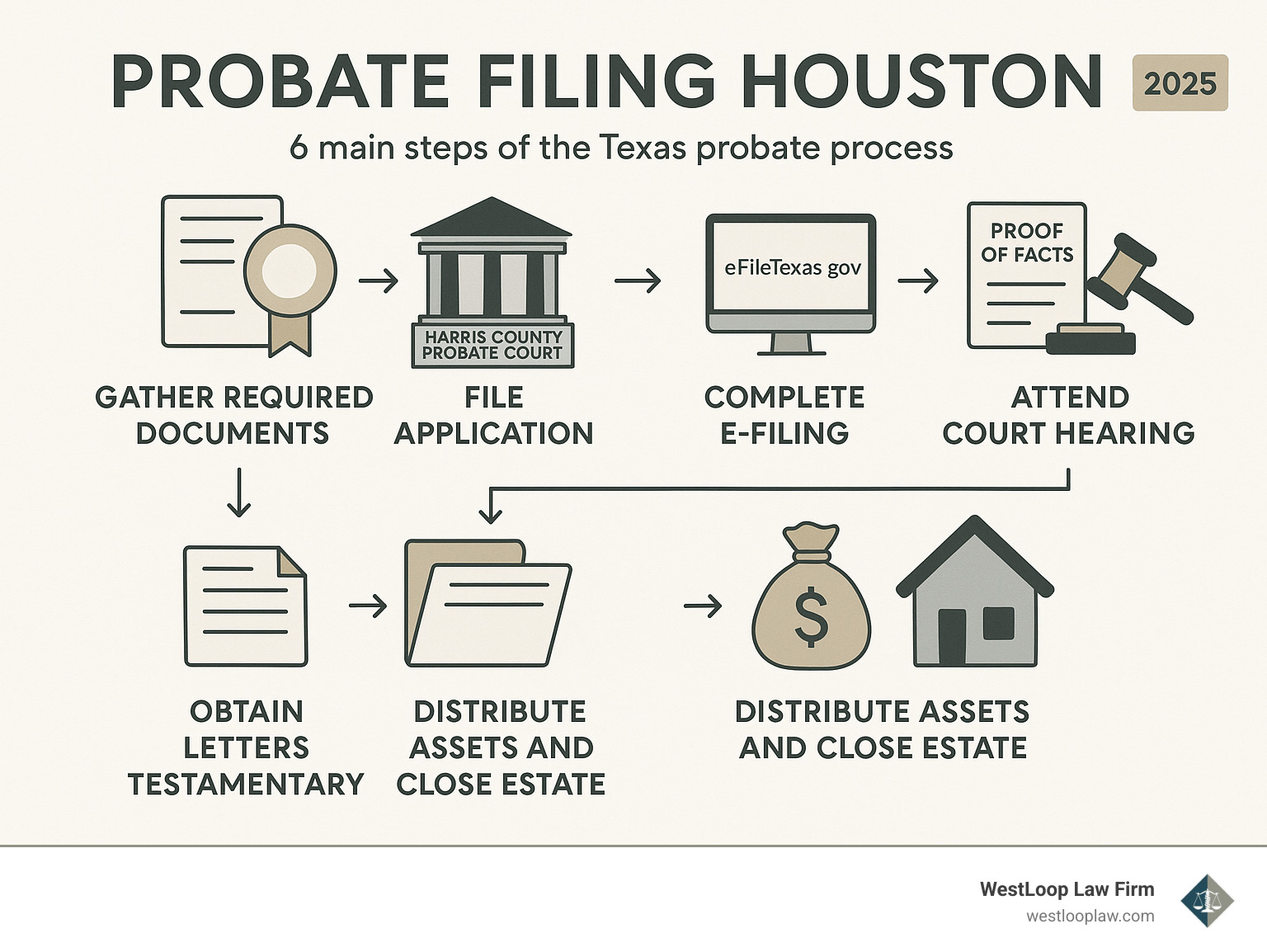Why Houston Probate Filing Requires a Clear Roadmap
Probate filing Houston can feel overwhelming when you’re already dealing with the loss of a loved one. The legal process of settling an estate involves multiple steps, strict deadlines, and detailed paperwork that must be filed correctly with Harris County courts.
Here’s what you need to know about probate filing in Houston:
- Where to file: Harris County has five Probate Courts located at 201 Caroline Street and 1115 Congress Street
- Filing deadline: Generally 4 years from the date of death (Texas Estates Code section 256.003)
- Required documents: Original will, death certificate, application for probate, and beneficiary information
- Filing fee: $360 for most new probate matters in Harris County
- E-filing: Mandatory for attorneys through eFileTexas.gov, with additional $30 state fee and $2 county fee
The probate process in Houston typically takes 6 months to several years depending on the estate’s complexity. As one legal professional notes: “On the surface, filing for probate is as simple as submitting an application to the appropriate court to initiate the process. In reality, the process is much more nuanced.”
Understanding the five types of probate available in Texas – from simple Small Estate Affidavits for estates under $75,000 to full Independent Administration – can save you time and money. The key is knowing which path fits your situation and having all required documents ready before you begin.
Probate filing Houston terms at a glance:
First Steps: Understanding Probate in Houston
Losing a loved one is hard enough without navigating complex legal processes. Understanding probate filing Houston basics can make this time more manageable. Probate is the court-supervised process of settling an estate. It ensures the deceased’s wishes are honored, debts are paid, and property goes to the right people. The court validates the will, settles debts, and oversees asset distribution to beneficiaries. In Houston, this happens through the five Harris County Probate Courts (located at 201 Caroline Street and 1115 Congress Street), where judges and clerks guide families through the process.
What are the Different Types of Probate in Texas?
Texas offers several paths for probate, and picking the right one can save you time and money.
- Independent Administration is the preferred route when there’s a valid will. The court appoints an executor who manages the estate with minimal court supervision, resulting in fewer court appearances and lower legal fees.
- Dependent Administration requires much more court involvement. The administrator needs court permission for nearly every action, like selling property or paying bills. This is common when there’s no will and heirs disagree.
- Muniment of Title is a streamlined option for simple situations with a valid will but no debts (other than a mortgage). This process validates the will so property can be transferred quickly.
- The Small Estate Affidavit is for small estates worth $75,000 or less (excluding the home). If there’s no will, this process avoids formal probate entirely.
- Heirship Proceedings are necessary when someone dies without a will. The court officially determines the legal heirs under Texas law, often in combination with another form of administration.
Choosing the right path is crucial and depends on the will, assets, debts, and family cooperation.
The Role of the Executor or Administrator
The person in charge of the estate is the executor (named in a will) or administrator (appointed by the court). This person has a legal fiduciary duty to act in the estate’s best interests. Their primary tasks include:
- Gathering assets: Tracking down all property the deceased owned, from bank accounts to real estate.
- Notifying everyone: Informing beneficiaries, heirs, and creditors. The law requires publishing a notice in a local newspaper for unknown creditors.
- Paying legitimate debts and taxes: Reviewing all claims, paying valid bills, and filing final tax returns.
- Filing the inventory: The court requires a detailed “Inventory, Appraisement, and List of Claims” that catalogs every asset and debt, providing a clear picture of the estate.
- Distributing remaining property: After all debts and taxes are settled, the executor follows the will or state law to distribute assets to the rightful recipients.
This is a significant job requiring attention to detail. The Fiduciary Handbook for Estates provides helpful guidance for this important role.
Your Step-by-Step Guide to Probate Filing in Houston
The probate filing Houston process involves several steps with specific requirements. Having a clear roadmap makes all the difference in navigating the Harris County court system.
Probate courts operate on precision. They have specific requirements and firm deadlines. With the right preparation, you can steer this process successfully.
Step 1: Gather Required Documents for Your Probate Filing in Houston
Before filing, you must gather essential paperwork. This preparation is key to a smooth process.
- The original will: The court requires the actual document, not a copy. Locating this is your first priority.
- Official death certificate: You’ll need a certified copy from the vital records office to prove the death.
- The application for probate: This is your formal request to the court, detailing who died, who seeks to manage the estate, and what type of probate you’re requesting.
- Beneficiary information: Have accurate names and addresses for all heirs, as Texas law requires they receive notice.
- A preliminary list of assets and debts: This helps you complete the application accurately and gives the court an initial overview.
Step 2: File the Application with the Correct Court
Once your documents are ready, you must file with the correct Harris County Probate Court. The rule is to file where the deceased person lived. A crucial point is the deadline: the Texas Estates Code section 256.003 gives you four years from the date of death to probate a will. Missing this window can create serious complications. The filing fee in Harris County is $360 for most new cases, which must be paid upon filing. Harris County’s five Statutory Probate Courts are equipped to handle these matters efficiently.
Step 3: Steer the E-Filing Process
Since 2014, e-filing is mandatory for attorneys in Harris County and highly recommended for everyone doing a probate filing Houston. It’s faster and more reliable.
The main portal is efileTexas.gov. Key things to know:
- Additional Costs: Expect a $30 state fee and a $2 county fee per submission, plus a service provider convenience fee.
- The Original Will: This document cannot be e-filed. You must deliver the physical will to the Harris County Clerk within three business days of your electronic filing. This is a critical step.
- Common Rejection Reasons: To avoid rejection, double-check that you’ve filed in the right jurisdiction, paid the correct fees, and submitted searchable PDFs.
Step 4: The Hearing and Next Steps
After filing, the court issues a citation, a public notice that is posted for at least 10 days. This waiting period allows interested parties to come forward. After this, the court schedules a hearing. At the hearing, you present evidence to the judge, usually a sworn document called a “Proof of Facts.” This document confirms key details about the deceased and the will’s validity. If the judge is satisfied, they will sign an order and issue Letters Testamentary (for executors) or Letters of Administration. These official documents are your legal authority to manage the estate. Financial institutions often require these letters to be recently issued (within 60 days). Your next major task is to file the Inventory, Appraisement, and List of Claims within 90 days of your appointment. This comprehensive list of assets and debts serves as the roadmap for settling the estate.
Navigating Timelines, Costs, and Common Scenarios
When dealing with probate filing Houston, two key questions are how long it will take and how much it will cost. While every estate is different, understanding the general expectations can help you prepare for the journey.
How Long Does Probate Take in Houston?
A common question is, “How long will this take?” While there’s no single answer, most straightforward probate cases in Houston take from six months to two years. The timeline can vary dramatically based on several factors:
- Complexity of the estate: A simple estate with a house and a bank account moves faster than one with business interests or multiple properties.
- A valid will: A properly executed will smooths the process. If there’s no will, the court must first determine the legal heirs, adding time and complexity.
- Family dynamics: When beneficiaries agree, things move quickly. If someone contests the will or disputes arise, the process can stretch for several years.
- The court’s caseload: The availability of the Harris County probate courts can also affect how quickly your case moves forward.
Understanding the Costs of Probate Filing in Houston
Understanding the costs of probate filing Houston helps you budget and avoid surprises.
| Cost Category | Typical Amount | Details |
|---|---|---|
| Court Filing Fees | $360 | Standard fee for most new probate applications in Harris County |
| E-Filing Fees | $32 | $30 state fee + $2 county fee per filing envelope |
| Attorney Fees | $3,000 – $15,000+ | Varies based on estate complexity; some charge hourly ($300-500/hour), others flat fees |
| Executor/Administrator Fees | Up to 5% of estate value | Texas law allows reasonable compensation, often 2.5-5% of gross estate |
| Court-Appointed Fees | $500 – $2,000+ | Ad Litem attorney fees, appraisal costs, accounting fees |
| Publication Costs | $200 – $400 | Required legal notices in local newspapers |
The initial $360 filing fee is just the start. Attorney fees are often the largest expense and vary based on case complexity. Texas law also allows executor compensation (often 2.5% to 5% of the estate’s value), though this can be waived. Other additional costs can include appraisal fees, accounting fees, and fees for court-appointed attorneys (“Ad Litems”).
What if There Is No Will? (Intestate Succession)
When someone dies without a will (dying “intestate”), their estate still goes through probate. This often makes probate filing Houston more complicated and expensive.
Texas intestacy laws dictate who inherits property based on family relationships, which may not align with what your loved one wanted. The court must appoint an administrator to handle the estate. A formal “Determination of Heirship” proceeding is also required to legally establish the heirs, which involves presenting evidence of the family tree. This process generally takes longer, costs more, and has a higher likelihood of family disputes. This is why even a simple will is so important for saving your family time, money, and stress.
Can You Avoid Probate or Handle it Without an Attorney?
It’s natural to wonder if you can avoid probate or handle probate filing Houston without an attorney. The answer is sometimes, but it’s important to understand the implications before you decide.
Probate exists to protect everyone involved, but that doesn’t mean it’s always necessary or that you always need professional help.
Methods for Avoiding Probate in Texas
For those planning their own estates, several strategies can help your loved ones avoid probate. These tools work by transferring assets automatically at death, keeping them out of the probate estate.
- Living trusts: You transfer assets into a trust, which you control during your life. After death, a successor trustee distributes the assets according to your wishes without court involvement.
- Payable-on-death (POD) and transfer-on-death (TOD) accounts: You can name beneficiaries directly on bank accounts, investment accounts, and even vehicles in Texas, allowing for an immediate transfer.
- Joint ownership with right of survivorship: Common for couples, this allows the surviving owner to automatically receive full ownership when the other dies.
- Small Estate Affidavit: For estates under $75,000 (excluding the homestead) with no will, this simplified process can transfer assets without formal probate.
These tools must be set up correctly during your lifetime to be effective.
Do I Need a Lawyer to File for Probate?
Legally, you can represent yourself (“pro se”) in probate court, but it’s a significant challenge. Just because you can handle probate filing Houston on your own doesn’t mean you should.
Probate law is complex, with strict statutes and court procedures. A small mistake can delay your case for months. Court staff, while helpful, are legally prohibited from giving legal advice. They can’t tell you how to fill out forms or what legal strategy to use. The cost of mistakes—from rejected filings to personal liability for mismanaging the estate—can far exceed the cost of hiring an attorney.
While self-representation might be possible for a very simple estate with cooperative beneficiaries, most people find that hiring an experienced probate attorney provides peace of mind. An attorney can ensure efficiency, avoid costly errors, and reduce your stress during a difficult time.
Frequently Asked Questions about Houston Probate
When you’re dealing with probate filing Houston, it’s natural to have questions. Here are answers to some of the most common ones we hear.
How long do I have to file for probate in Texas?
You generally have four years from the date of death to file for probate in Texas, according to the Texas Estates Code. While this sounds like a long time, it’s best to start the process early to gather documents and handle any surprises. Waiting can create unnecessary complications.
Where can I find official probate forms for Harris County?
The Harris County Clerk’s website provides many official forms and resources. You can find downloadable forms and resources here. For in-person research, the County Law Library at 1019 Congress, Houston, Texas 77002 is an excellent resource. Staff at either location cannot provide legal advice.
What is the difference between an executor and an administrator?
The difference is based on whether there is a will.
- An executor is named in the deceased’s will to manage their estate. They were chosen by the person who died.
- An administrator is appointed by the court when there is no will, or if the named executor is unable or unwilling to serve.
Both roles have the same legal responsibilities and fiduciary duties to act in the best interests of the estate and its beneficiaries.
Your Partner in Navigating Houston Probate
The probate filing Houston process doesn’t have to be overwhelming. With a clear roadmap and proper support, you can successfully settle your loved one’s estate. The key is accuracy, as each detail—from gathering the will to meeting deadlines—counts. Missing a step can cause delays and add stress for your family.
Understanding the process reduces anxiety and empowers you to make informed decisions. A smooth probate administration also minimizes family stress, allowing everyone to focus on what truly matters.
At WestLoop Law Firm, we understand that probate is about more than legal documents; it’s about families and legacies. Our team has guided countless Houston families through this process with legal knowledge and compassion. While this guide provides a foundation, having knowledgeable legal counsel can make the difference between a process that feels overwhelming and one that feels manageable.
For legal guidance on settling an estate in Houston, contact our experienced team. We’re here to help you steer this process with confidence and care. Learn more about our Houston probate services.





